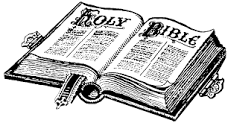How We Got The Bible Part 3
Hopefully you can see the significance of the Deutero books if Jesus and the apostles were apparently highly familiar with them and used them to teach the Gospel to the first Christians.
Back to our timeline:
1546 – Council of Trent reaffirms that the Bible has the 73 books originally identified in 393 at Council of Hippo and previously used by St. Athanasius in 367.
1582 – Douhay-Rheims Catholic New Testament printed in English.
- All 73 books included.
- The Catholic Church approved of the printing.
1611 – King James Bible printed in English.
1947 – The first Dead Sea Scrolls are discovered, undermining the long-held theory that the Deutero books were not written in Hebrew and were therefore, not inspired.
Most Bibles printed today contain all 73 books once again. It seems as though Luther’s efforts just didn’t stick. Some non-Catholic versions still relegate the Deutero books to an appendix, but some have put them right back where St. Jerome had them in the early 400’s.
So let’s tackle a few of the most common myths about the Catholic Church and its relation to the Bible:
- The Church tried to keep the Bible out of the hands of the common people: False.
- The Church tracked down those who printed the bible in a language other than Latin and burned them at the stake, or otherwise executed them or imprisoned them: False.
- The Church tracked down those who owned a bible in a language other than Latin and burned them at the stake, executed them or imprisoned them: False.
- The Church chained the Bible to the Ambo (pulpit) in some Catholic churches: This one is actually partially true, but not for the reasons an anti-Catholic will claim.
- The Church confiscated and burned Bibles: Again, this one is partially true, but not for the reasons an anti-Catholic will claim.
- The Church insisted on keeping the Bible in Latin in order to keep the common person from reading it: False.
- The Church declared the Catholic Canon (73 books) for the first time at the Council of Trent in 1556: False.
- The Church teaches that Tradition is more important than the Bible: False.
- The Church has many teachings that have no relation to the Bible: False.
- The Church added books to the Bible which is why some non-Catholic versions have only 66 books: False
The fact is, you have the Bible you own today, because of the Catholic Church. The Church was the only Christian Church in existence until the 1500’s and has always been the only Church which received the Bible and retained it unaltered since the apostolic age.
Why didn’t most Christians own their own Bible until the 1500’s?
The early Christians were under severe persecution by the Romans and in some cases by the misguided Jewish high priests as well as some pagan warriors. For hundreds of years, any and all Christian writings and Christian objects, such as art and devotionals, were subject to being confiscated and destroyed at a moment’s notice. Those in possession of Christian materials were themselves, subject to severe punishment, including imprisonment and death. Punishment was designed to terrorize the victim’s family, friends and community into denying their Catholic faith, so even those who held true to their faith, engaged in secretive communications and behavior in order to keep the Church alive. Much of the teaching during the early years of the Church was through oral tradition for at least two reasons. The oral tradition left no physical evidence of Christianity that could get a person killed. Secondly, many people were illiterate and therefore, written materials were useless to them.
Even after governmental suspicion about Christianity lightened, most people were illiterate and the weakened Roman Empire slowly became more and more vulnerable to attacks from her enemies. When Roman cities were overrun by invaders, there was significant destruction. In that process, many items of antiquity were lost, including Christian writings. But many Catholics continued to risk their lives in order to protect the various books of the Bible from these invaders.
Papyrus, which was what the earliest autographs and copies were written on, has a limited lifetime. Therefore, as the originals and the early copies began to fall apart and become unusable, Catholics, including Catholic Monks, began the process of making new copies on parchment and eventually paper. But the process of handwriting the entire Bible is extremely slow, especially when you are attempting to make it as beautiful and as perfect as you possibly can. This meant that there were never very many Bibles in existence at any given time before the Gutenberg printing press was invented in 1455. Additionally, the Bibles were revered, therefore, most Bibles produced were decorated with precious stones and contained intricate artwork which included actual gold.
As new Catholic Cathedrals, churches, chapels, seminaries and monasteries were being built, more Bibles had to be produced for liturgical purposes. Additionally, due to the valuable materials (not just the jewels and gold, parchment itself was expensive as well) most individuals could not afford the few available copies of the Bible. Royalty and other wealthy families usually had their own Bibles, but once again, they were more likely to be educated enough to read them too.
Therefore, most Bibles were found in Catholic churches. Unfortunately, thieves recognized the fact that they could remove the Bibles from the churches and dismantle them to salvage the jewels and the gold. This led to the practice of putting the Bibles under lock and key or somehow fastening them to the ambo in the Church so they could not be carried off. When I was younger, most public pay phones (fast becoming antiques themselves) had a phone book that was chained to the phone. I wonder if Ma Bell will someday be accused of trying to keep phone books out of the hands of the average American.
What about Bible burning, Bibles in the local language and other access to Scripture? Did the Church confiscate Bibles and punish Catholics who wanted to own their own Bible?
Additionally, throughout history, there have been many individuals and groups who have tried to mislead or mischaracterize one or more Catholic teaching. Such people or groups were called heretics. Heretics commonly printed their own distorted versions of the Bible, or portions of the Bible. They sometimes printed these writings in the common language as well as Latin, because they wanted to reach anyone and everyone who could read, and they did not care whether or not people understood the heresy. This is the interesting difference between heresy and Christianity. The Church wants people to know and understand the truth, so the information and the method of teaching it accurately, matters. Heretics do not have to be as careful about what and how the heresy is disseminated because their main focus is to distract, confuse and mislead. For the heretic, anything will do, but for Christians, only the truth will suffice.
Regardless of the language used, the Church did all she could to recover these misleading documents and destroy them. The easiest and most permanent way to get rid of heretical writings and flawed translations was to burn them. The Church burned many such writings, but never the authors themselves. In hindsight, the Church may have been wise to take it to the next level, but often the secular government would execute the leaders of the various heretical groups for their own reasons.
The secular governments were often populated with Catholics, but up until the reformation, every Christian in Europe was Catholic, so this should not come as much of a surprise. However, simply being Catholic does not make a person merciful, gentle and forgiving. Kings, Queens and others in power were often very strict and unforgiving for the simple reason that they knew that others in their court or in their kingdom, were watching them for the slightest hint of weakness. If a ruler was suspected of being too lenient on a criminal on some group, he or she may end up dead, imprisoned, deposed or exiled by those around them who were intent on making a power play.
While the Church certainly did everything it could to stamp out heresy and declared certain people to be heretics, the Church did not carry out the sentences. Instead, the Church would turn the person over to the civil authorities and would often ask for lenience, which meant a fate short of death. But the civil authorities usually wanted the heretic dead because the heretics usually had a hatred for the civil government as well. Civil leaders did not want to risk an escape because a guard was bribed or end up on the wrong end of the sword if the current leaders were toppled and all of the sudden the new King or ruler was someone sympathetic to the imprisoned heretic.
So the Church continued to protect the integrity of the Bible while the dishonest and the misguided were trying to produce forgeries and other dishonest versions that were designed to direct people from the truth.
Yet, for 100’s of years, the Church saw to it, that most authorized Bibles were in Latin. This was necessary for a few reasons. For that same period of time, most educated people could read Latin. The uneducated could not read anything. Therefore, taking the valuable time to produce a Bible in a language other than Latin would have been fruitless. The Church was actually trying to make the Bible available to as many people as possible and Latin was the best way to ensure that. Meanwhile, the Church was developing an educational system that would help more people learn to read Latin, thereby, making the written word available to more people.




